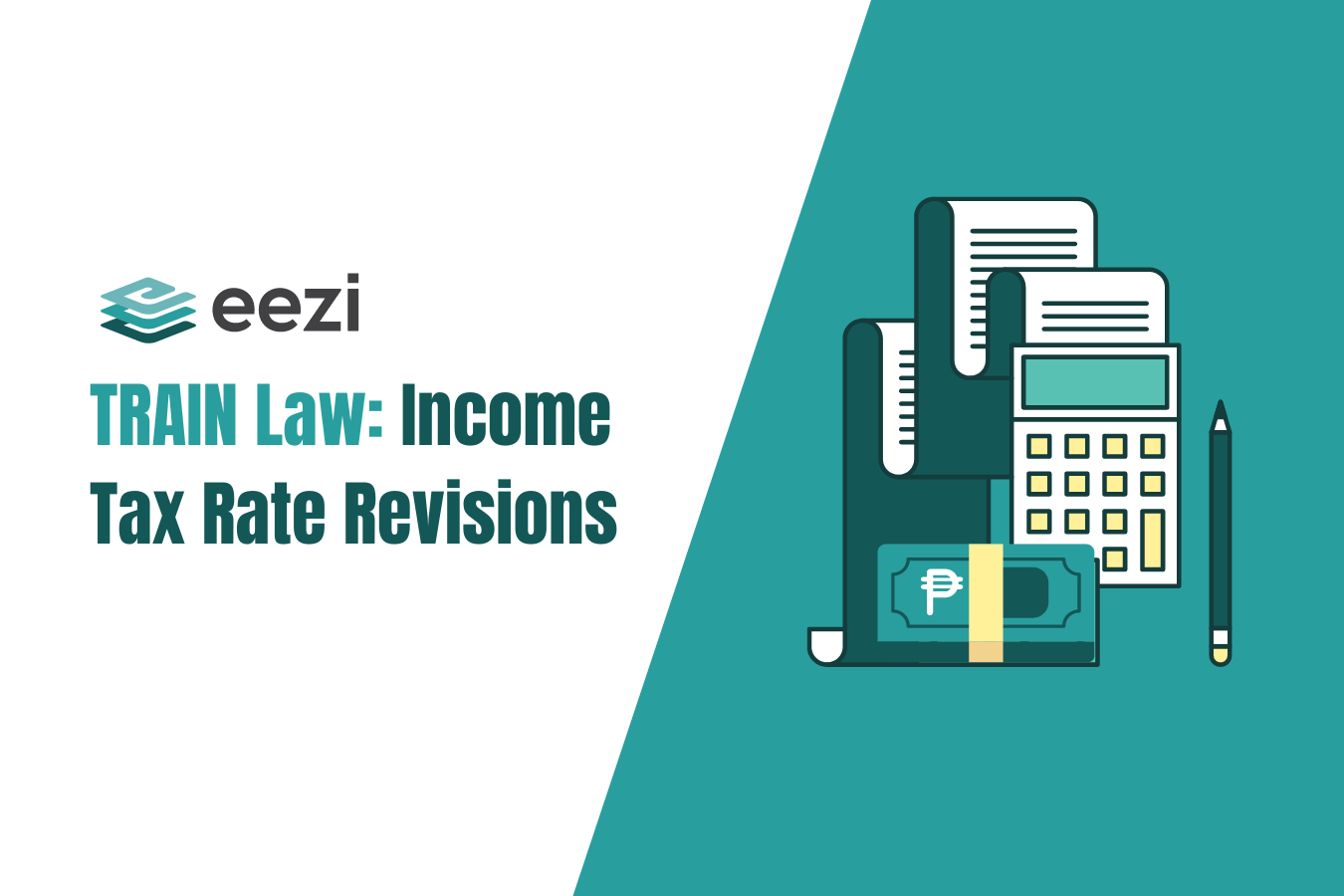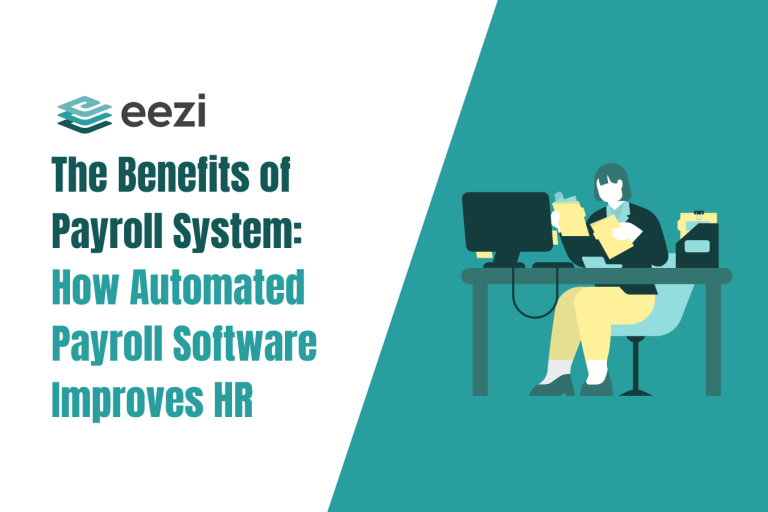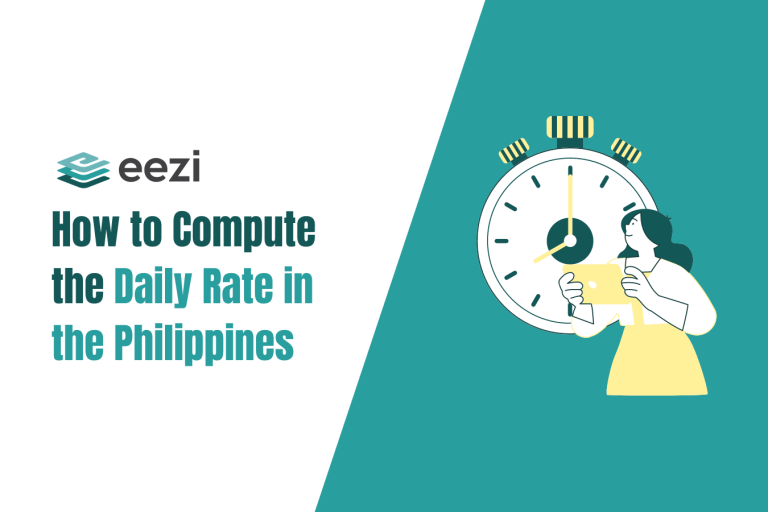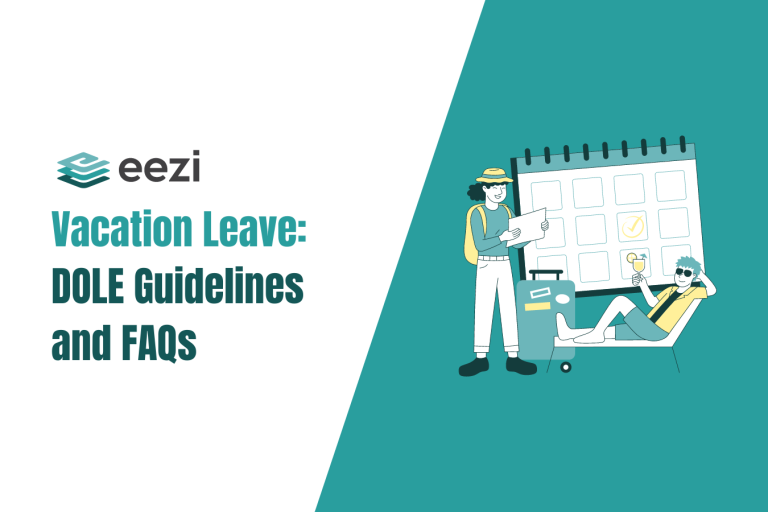What is the effect of TRAIN Law on your income and take-home pay this 2023? Learn more about your taxes and how to compute them.

Tax Reform for Acceleration and Inclusion (TRAIN) Law
The Tax Reform for Acceleration and Inclusion (TRAIN) Law, officially known as the Republic Act (RA) 10963, is a significant legislative reform that overhauled the tax system in the Philippines. Enacted in 2017, it introduced a series of changes aimed at streamlining the country’s tax system and structure. The TRAIN Law primarily focused on the following key areas:
- Personal Income Taxes: The law aims to reduce paying personal income taxes for most taxpayers. As a result, it puts more money in the pockets of Filipino workers.
- Estate Tax: Estate tax provisions aims to make it more equitable and less burdensome for heirs.
- Donor’s Tax: The tax reform law introduced changes to the donor’s tax, impacting transactions involving the transfer of property and assets.
- Value-Added Tax (VAT): Changes in VAT regulations aimed to make the system simpler and fairer, with certain exemptions and thresholds.
- Documentary Stamp Tax: The law modified the documentary stamp tax, affecting various legal documents and transactions.
- Excise Taxes: The tax reform law increased the excise tax rate of specific products. This includes automobiles, petroleum products, sweetened beverages, cigarettes, and mineral products. These increases intend to generate additional revenue for the government.
Additionally, the TRAIN Law brought about improvements in the administration of percentage taxes to enhance efficiency and compliance.
Ultimately, the primary objectives of the TRAIN Law were to simplify the tax system and reduce personal income tax rates. Moreover, it aims to generate revenue by increasing the tax rate on selected products and services. This approach aimed to create a more equitable withholding tax system and address economic challenges, including poverty reduction.
Income Tax (TRAIN) CalculatorWhy paying personal income taxes is important
Income taxation is a crucial component of a country’s tax system. Additionally, it plays a pivotal role in generating revenue for the government. Put simply, it is a withholding tax on an individual’s annual taxable income or total earnings over the course of a year. In the Philippines, as in many other countries, an employee’s annual taxable income is based on their gross income taxation level or bracket.
Key points about income taxes in the Philippines:
- Taxable Income: Individuals earning more than Php 250,000 per year in the Philippines must adhere to paying income tax rate based on the income tax table. This includes those who work for employers, are self-employed or earn their gross income through other means.
- Withholding Tax: For employees, income tax is an automatic deduction from their taxable income on a monthly basis. In the payslip, this appears as withholding tax. This tax system ensures that individuals fulfill their tax obligations gradually throughout the year.
- Exemption for Low Earners: The law does not require individuals earning below Php 250,000 to file an Income Tax Return (ITR). This exemption aims to ease the tax burden on lower-income individuals.
Related:
- Calculating Withholding Taxes
- Tax Rates for Contractual Employees
- Tax annualization in the Philippines
- Other calculators
Pre-TRAIN law vs. TRAIN law income tax rates
The Tax Reform for Acceleration and Inclusion (TRAIN) Law, signed in December 2017 and effective from January 1, 2018, brought significant changes to the Philippines’ Personal Income Tax (PIT) rates. These changes in taxable income had a substantial impact on various categories of earners in the country.
Old vs. new income tax rates
Before the implementation of the TRAIN Law, the personal income tax rates were the same for purely Compensation Income Earners, Mixed Income Earners, and Self-Employed and Professionals. However, the tax reform law introduced a separation of personal income tax rates and schedules for these three categories. Let’s delve into these changes:
- Compensation income earners: Under the previous system, Compensation Income Earners faced a specific set of tax rates. The TRAIN Law introduced new tax brackets and significantly lowered the rates, reducing the salary tax rate liabilities for many employees.
- Mixed-income earners: Individuals with mixed gross income sources, such as employment and business income, also experienced changes in their tax rate obligations. The TRAIN Law adjusted the tax schedules for this group, affecting how they calculated their income taxes.
- Self-employed and professionals: Self-employed individuals and professionals saw modifications to their income taxes as well. These changes aimed to align the tax system with the goal of making taxation fairer and more progressive.
Old income taxation schedule
Before the implementation of the TRAIN Law, the Philippines implemented the following tax schedule:
Old income tax schedule:
- Earnings up to Php 10,000: Individuals earning Php 10,000 or less had a gross income tax rate of 5%.
- Earnings between Php 10,000 and Php 30,000: Php 500 plus 10% of the excess over Php 10,000.
- Earnings between Php 30,000 and Php 70,000: Php 2,500 plus an additional 15% of the amount exceeding Php 30,000.
- Earnings between Php 70,000 and Php 140,000: Php 8,500 plus 20% of the excess over Php 70,000.
- Earnings between Php 140,000 and Php 250,000: Php 22,500 plus 25% of the amount exceeding Php 140,000.
- Earnings between Php 250,000 and Php 500,000: Php 50,000 plus 30% of the excess over Php 250,000.
- Earnings over Php 500,000: Php 125,000 plus 32% of the amount exceeding Php 500,000.
Compensation income earners: New tax rates and tax schedule

Effective January 1, 2023, the TRAIN Law brought about a new gross income taxation schedule for compensation income earners, simplifying the tax system and providing relief for lower-income individuals. Here are the key provisions of the new tax schedule:
- Income up to Php 250,000: Compensation income earners with an annual income of Php 250,000 or below are exempted from paying personal income taxes. This means that no withholding tax will be collected from them.
- Income over Php 250,000 but not exceeding Php 400,000: 15% of the excess over Php 250,000
- Income over Php 400,000 but less than Php 800,000: Php 22,500 with an additional amount equal to 20% of the excess over Php 400,000
- Income over Php 800,000 but not more than Php 2,000,000: Php 102,500 plus an amount equal to 25% of the excess over Php 800,000
- Income exceeding Php 2,000,000 but not exceeding Php 8,000,000: Php 402,500 plus 30% of the excess over Php 2,000,000
- Income over Php 8,000,000: Php 2,202,500 and an additional amount equivalent to 35% of the excess over Php 8,000,000
Self-employed and professionals: New tax rates and tax schedule
Under the TRAIN Law, self-employed individuals and professionals have flexibility in how they can fulfill their tax obligations. Individuals earning Php 3,000,000 or less annually can opt to follow the regular rates for Personal Income Taxes (PIT), which are based on their income levels, or they can choose an alternative tax scheme.
Here are the details of these options:
- Regular PIT rates: PIT rates are progressive and depend on the individual’s income level. This option may be suitable for those with relatively lower incomes.
- 8% of gross sales or receipts: Pay the equivalent of 8% of their gross sales or receipts in excess of Php 250,000. This option is particularly attractive as it simplifies tax computation and can result in lower tax liabilities for some individuals.
Related: How to Calculate Your Annual Gross Income in the Philippines
Mixed-income earners: New tax rates and tax schedule
Mixed-income earners are individuals who receive both a salary from an employer and income from a business or the practice of a profession. Complying with the tax regulations for mixed-income earners involves computing income taxes for both sources of income separately.
Here’s how mixed-income earners can calculate their income taxes:
1. Salary income tax: The income taxation for the salary portion of mixed-income earners should follow the tax schedule for compensation pay earners. This means that the tax rates and brackets applicable to regular employees apply to determine income taxes and liabilities on their income.
2. Business or profession income tax: The income from a business or the practice of a profession is subject to income taxation as well. For this portion of their income, mixed-income earners should use the tax schedule for self-employed individuals and professionals, as applicable. This schedule will determine the income taxation liability for their business or professional income.
Challenges and considerations:
- Mixed-income earners may need to maintain separate records and documentation for their salary income and business or professional income to accurately compute their income taxes.
- It’s important to ensure compliance with both sets of tax regulations and deadlines for filing and payment.
- Consider consulting with a tax professional or accountant who can assist in computing and optimizing your income taxes and liabilities as a mixed-income earner.

Who is exempt from annual taxable income in the Philippines?
Income tax exemptions provide relief and incentives to specific groups or entities in the Philippines. Under the TRAIN Law, here are some key exemptions:
Non-resident citizens of the Philippines
The law exempts non-resident citizens from paying income taxes if they meet certain conditions:
- They have satisfactorily established to the Commissioner their bodily presence overseas and their intention to reside there.
- They are permanent employees or immigrants who leave the Philippines and live overseas during the taxable year.
- They work abroad and are required to stay the majority of the taxable year abroad.
- If they were previously non-resident citizens but have returned to the Philippines for permanent residence, they are exempt from paying income taxes only during the year of arrival.
Overseas Filipino Workers (OFWs)
OFWs are exempt from income taxes for income from outside the Philippines. However, any income they earn within the Philippines is taxable.
Seafarers
Seafarers who receive their compensation from outside the Philippines do not pay income taxes. However, they become subject to income taxation if they receive compensation or earn income within the Philippines.
General Professional Partnerships (GPPs)
GPPs are exempt from income taxes because their income does not come from trade or business involvement.
Government-Owned and Controlled Corporations (GOCCs)
Certain government-owned and controlled corporations and agencies, such as the Government Service Insurance System (GSIS), Social Security System (SSS), and Philippine Health Insurance Corporation (PhilHealth), are exempt from minimum corporate income tax.
Local Water Districts
The National Internal Revenue Code (NIRC) of 1997 dictates that local water districts are exempt from income tax. Instead, the law mandates the redirection of these taxes toward improving water services.

Exemptions on Personal Income Tax
Here are the key exemptions on personal income tax under the TRAIN Law:
- Minimum Wage Earners (MWEs):
- MWEs and individuals who earn purely compensation income and whose annual taxable income does not exceed Php 250,000 per year are exempt from paying income tax.
- No withholding or income tax collections from MWEs and those within this income threshold.
- De Minimis Benefits:
- De minimis benefits refer to allowances or benefits of small value awarded to employees by employers, separate from their basic compensation.
- These benefits are meant for the general welfare of the employee and are exempt from income tax.
- Other Benefits Not Exceeding Php 90,000:
- Other benefits provided to employees that do not exceed the amount of Php 90,000 annually are exempt from annual taxable income.
- This ceiling amount was raised from Php 82,000 with the implementation of the Tax Reform for Acceleration and Inclusion (TRAIN) law tax table.
Related: Rules on de minimis benefits in the Philippines
Designation of Funds from the TRAIN Law
The TRAIN Law, or Tax Reform for Acceleration and Inclusion Law, allocates its funds to various essential sectors and programs to address specific needs and promote development. Here are the key areas where the funds from the TRAIN Law go:
Medicine
The TRAIN Law allocates funds to exempt medicine for hypertension, diabetes, and high cholesterol from Value Added Tax (VAT) charges. This aims to make essential medications more affordable and accessible to the public.
Education
Funds from the TRAIN Law are directed towards the education sector. They are used to:
- Build additional classrooms to address overcrowding and promote a better learning environment.
- Hire more teachers to improve the teacher-to-student ratio, ensuring quality education for all.
Healthcare
The additional funding from the TRAIN Law is channeled into the healthcare system to:
- Upgrade existing hospitals and build new healthcare facilities, including barangay health stations, rural health units, and urban health centers.
- Work towards achieving total Philhealth coverage to provide affordable healthcare services to Filipinos.
- Hire more medical staff, practitioners, and health-related personnel to enhance healthcare services.
Infrastructure
- Funds from the TRAIN Law contribute to the government’s infrastructure development initiatives, including the Build, Build, Build program led by the Department of Public Works and Highways (DPWH).
- This program focuses on improving various aspects of infrastructure, such as roads, bridges, irrigation systems, and public facilities.
Pantawid Pasada Program (PPP)
- To mitigate the impact of excise taxes on fuels and the implementation of fare discounts, the TRAIN Law supports the Pantawid Pasada Program.
- This program provides vouchers or fuel cards to qualified franchisers of Public Utility Jeepneys (PUJs), helping them manage fuel costs and maintain affordable public transportation.
Related: Tax mapping in the Philippines
Frequently Asked Questions
What is the TRAIN Law?
The Tax Reform for Acceleration and Inclusion (TRAIN) Law, officially known as Republic Act (RA) 10963, is a significant legislative reform enacted in 2017 to overhaul the Philippine tax system. It aims to simplify the tax system, reduce personal income tax rates, and generate revenue by increasing the tax rate on selected products and services.
How does the TRAIN Law affect personal income tax?
The TRAIN Law lowers personal income tax rates for most taxpayers. Income up to Php 250,000 is exempt from tax, and new, lower rates apply to income above this threshold.
Who is exempt from paying personal income taxes under the TRAIN Law?
Minimum Wage Earners (MWEs), individuals earning less than Php 250,000 annually, non-resident citizens, Overseas Filipino Workers (OFWs) for foreign income, and Seafarers for foreign income are exempt.
How does the TRAIN Law affect self-employed individuals and professionals?
Self-employed individuals and professionals can choose between paying regular progressive PIT rates or a flat 8% of their gross sales or receipts exceeding Php 250,000.
What changes did the TRAIN Law introduce for mixed-income earners?
Mixed-income earners must compute taxes separately for salary income and business/professional income using the respective tax schedules.
How are funds from the TRAIN Law allocated?
Funds are allocated to sectors such as medicine (VAT exemptions), education (classrooms and teachers), healthcare (facilities and PhilHealth coverage), infrastructure, and the Pantawid Pasada Program (fuel subsidies for jeepney operators).
Deduct accurate taxes, always.
Calculate taxes and payroll accurately each time with eezi‘s automated payroll solutions.



